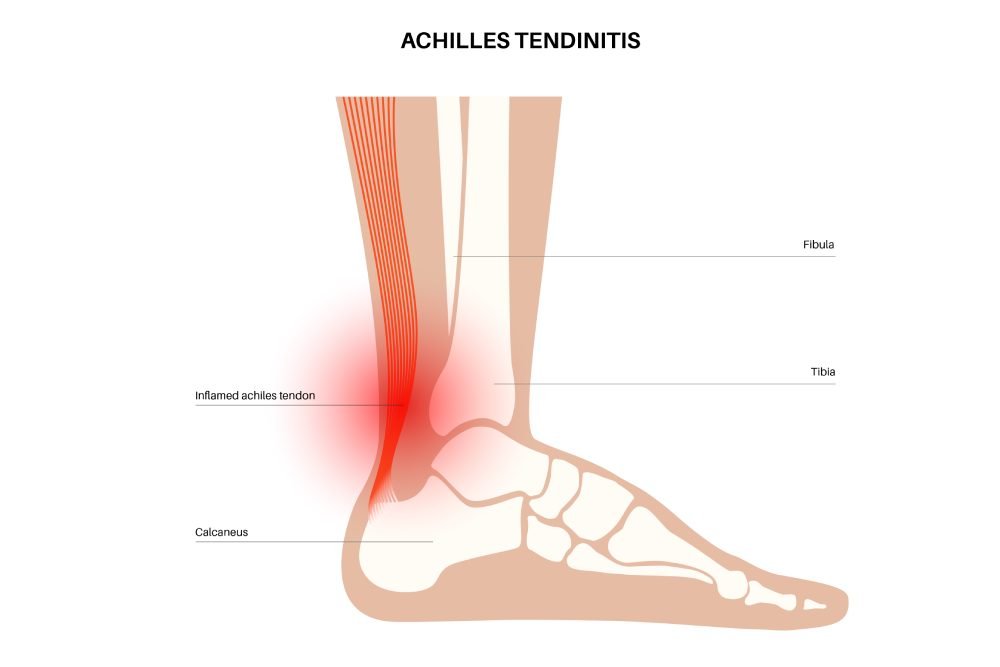
Achilles tendinitis
Schedule a consultation with Dr. Mithun Sivadasan, your top rated foot doctor, conveniently located near Hazlet, Holmdel, Lincroft and Red Bank in NJ.
What is Achilles Tendinitis?
Achilles tendinitis refers to the inflammation of the Achilles tendon, which connects the calf muscles to the heel bone. This condition commonly affects athletes who engage in sports that require repetitive jumping or running, but it can also occur due to sudden increases in physical activity or improper footwear.
Symptoms of Achilles Tendinitis
- Heel pain and stiffness along the Achilles tendon or, especially in the morning or after periods of inactivity.
- Tenderness or warmth around the tendon area.
- Swelling that worsens with activity.
- Thickening of the tendon.
Causes of Achilles Tendinitis
Several factors can contribute to the development of Achilles tendinitis:
- Overuse: Repeated stress on the tendon without proper rest can lead to micro-tears and inflammation.
- Poor footwear: Shoes that do not provide adequate support or that are worn-out can increase the risk of developing tendinitis or heel pain
- Tight calf muscles: Reduced flexibility can strain the Achilles tendon during physical activity.
- Sudden increase in activity: Rapidly intensifying exercise routines or training without proper conditioning.
Diagnosis and Treatment
At Middletown Foot & Ankle, our podiatrist, Dr. Mithun Sivadasan can diagnose the condition through a physical examination and may recommend imaging tests like an ultrasound or MRI for a more detailed assessment.
Treatment Options
Treatment for Achilles tendinitis aims to reduce pain and inflammation while promoting healing:
- Rest and activity modification: Avoid activities that exacerbate symptoms and incorporate rest periods into your routine.
- Ice therapy: Applying ice packs to the affected area can help reduce swelling and pain.
- Physical therapy: Stretching and strengthening exercises can improve flexibility and support tendon recovery.
- Orthotic devices: Custom orthotics can provide additional support and alleviate strain on the Achilles tendon and reduce heel pain
- Medications: Nonsteroidal anti-inflammatory drugs (NSAIDs) may be prescribed to reduce pain and inflammation.
In severe cases, when conservative treatments do not alleviate symptoms, your podiatrist may recommend PRP therapy (Platelet-Rich Plasma) or extracorporeal shockwave therapy to stimulate healing.
Prevention
To reduce the risk of Achilles tendinitis:
- Warm-up and stretch: Properly warm-up before exercise and stretch your calf muscles regularly.
- Gradual progression: Increase the intensity and duration of exercise gradually to allow your body to adapt.
- Proper footwear: Wear shoes that fit well and provide adequate support for your foot type and activity level.
Visit Middletown Foot Doctor
If you’re experiencing symptoms of Achilles tendinitis, don’t wait to seek treatment. Visit Middletown Foot & Ankle, a top rated podiatrist conveniently located in Monmouth County. Our expert team is dedicated to providing personalized care to help you recover and prevent future injuries. Contact us today to schedule an appointment or learn more about our services.
